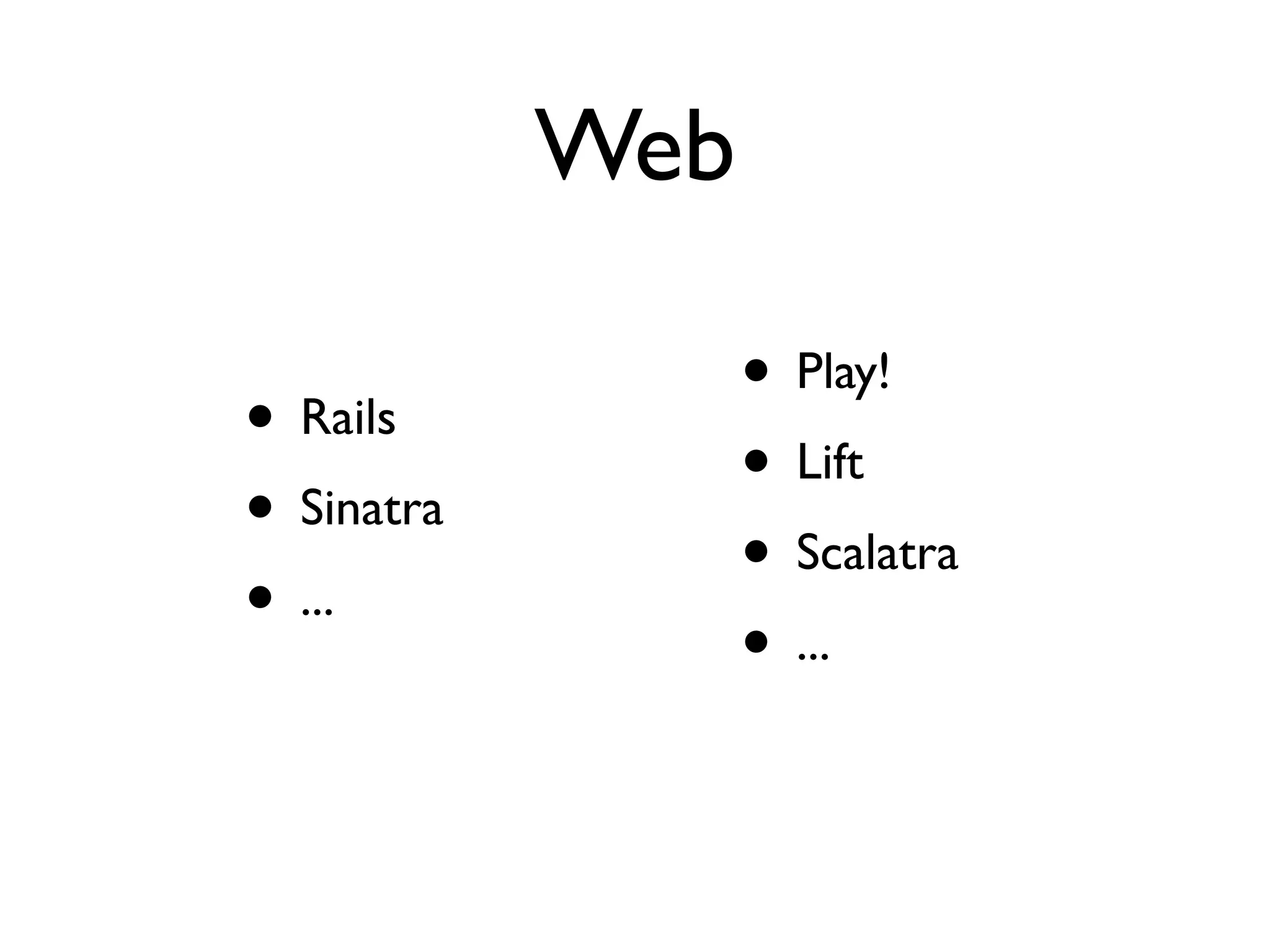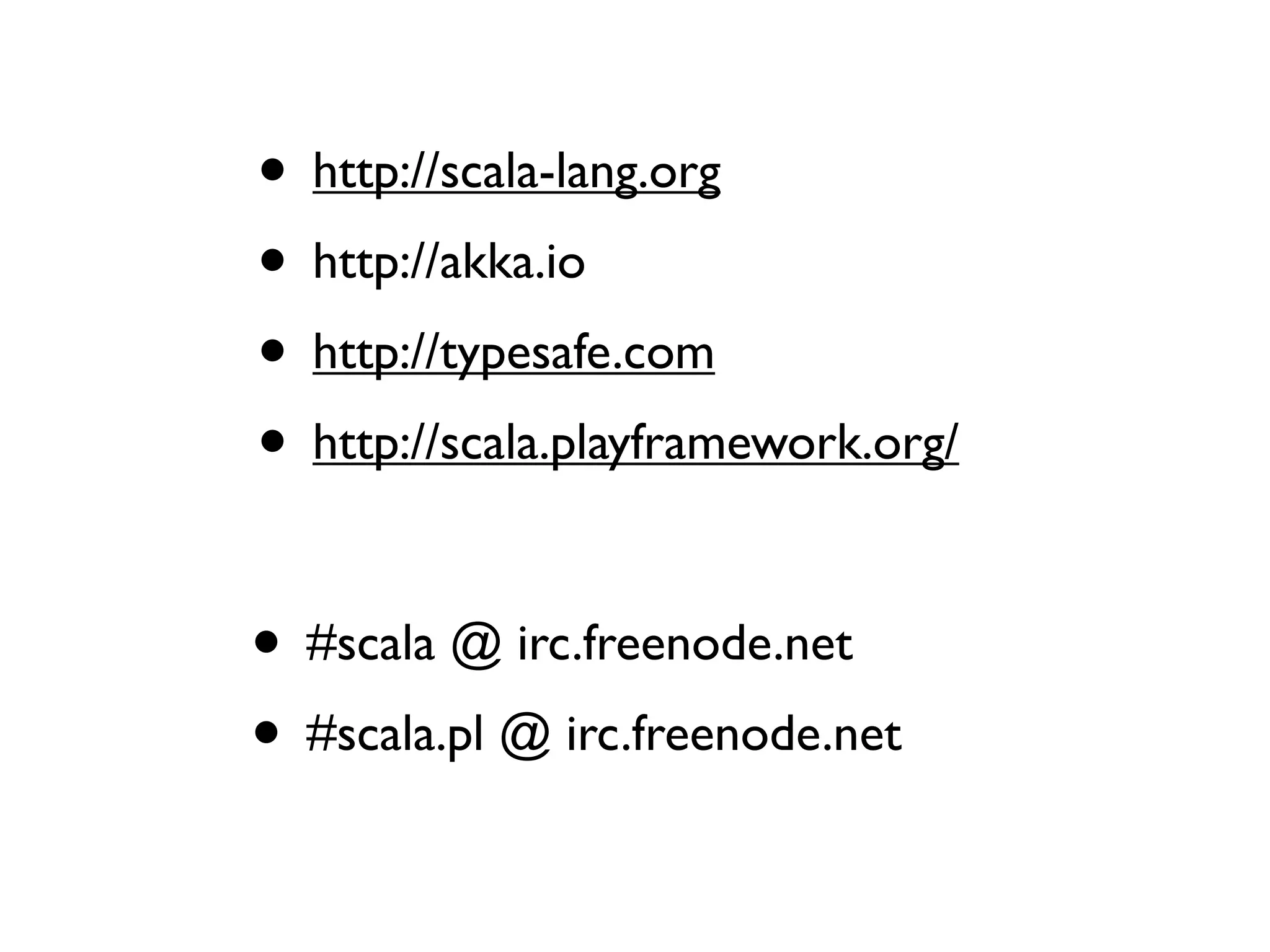This document provides an overview of the Scala programming language. Some key points:
- Scala is a statically typed language that runs on the JVM and supports both object-oriented and functional programming.
- Scala code examples demonstrate features like traits, implicit conversions, pattern matching, immutable data structures, and functional-style programming with maps, options, and pattern matching.
- Scala is used to build scalable and concurrent applications with libraries like Akka for actors and STM for software transactional memory. Popular web frameworks built on Scala include Play, Lift and Scalatra.
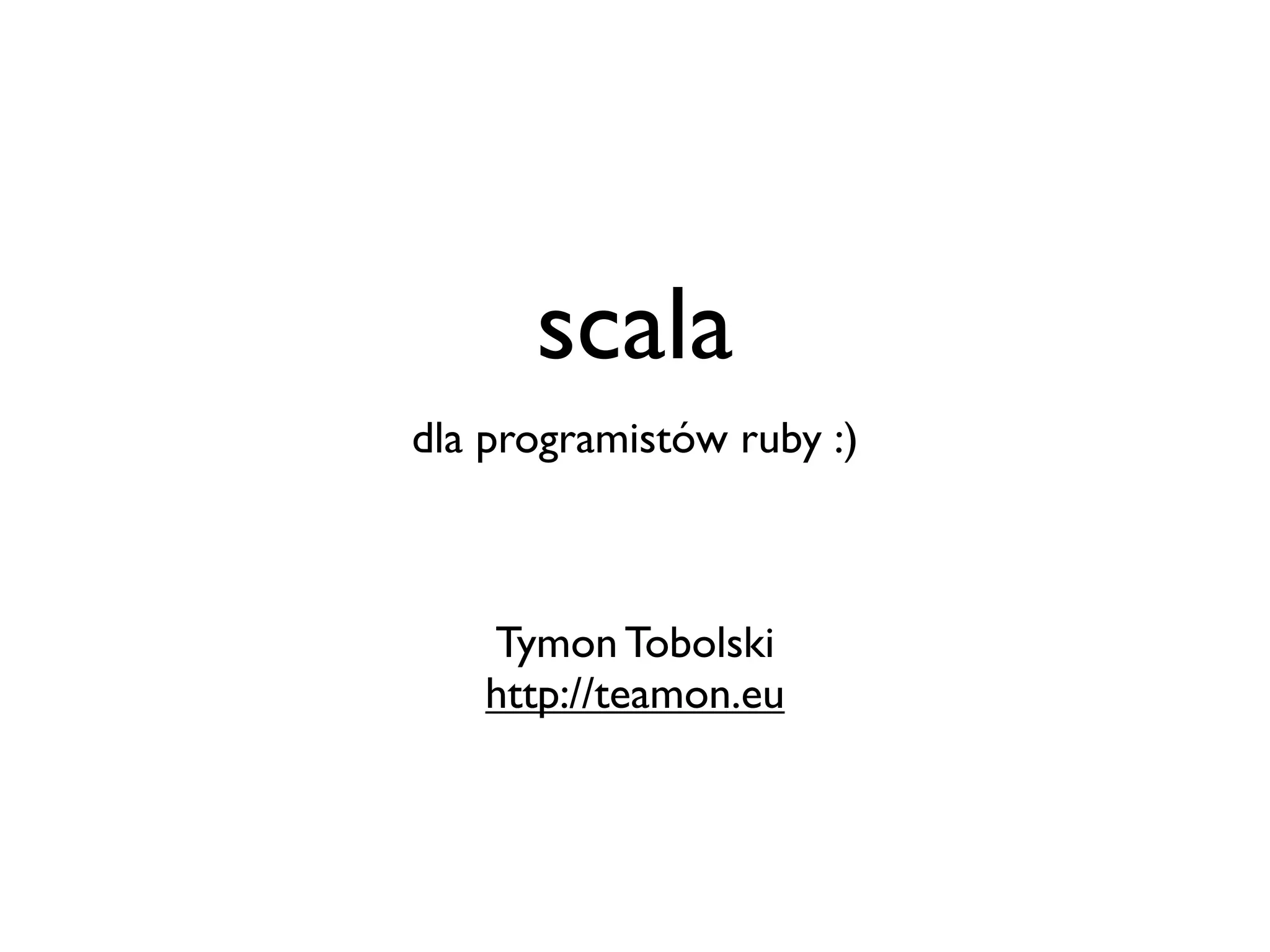
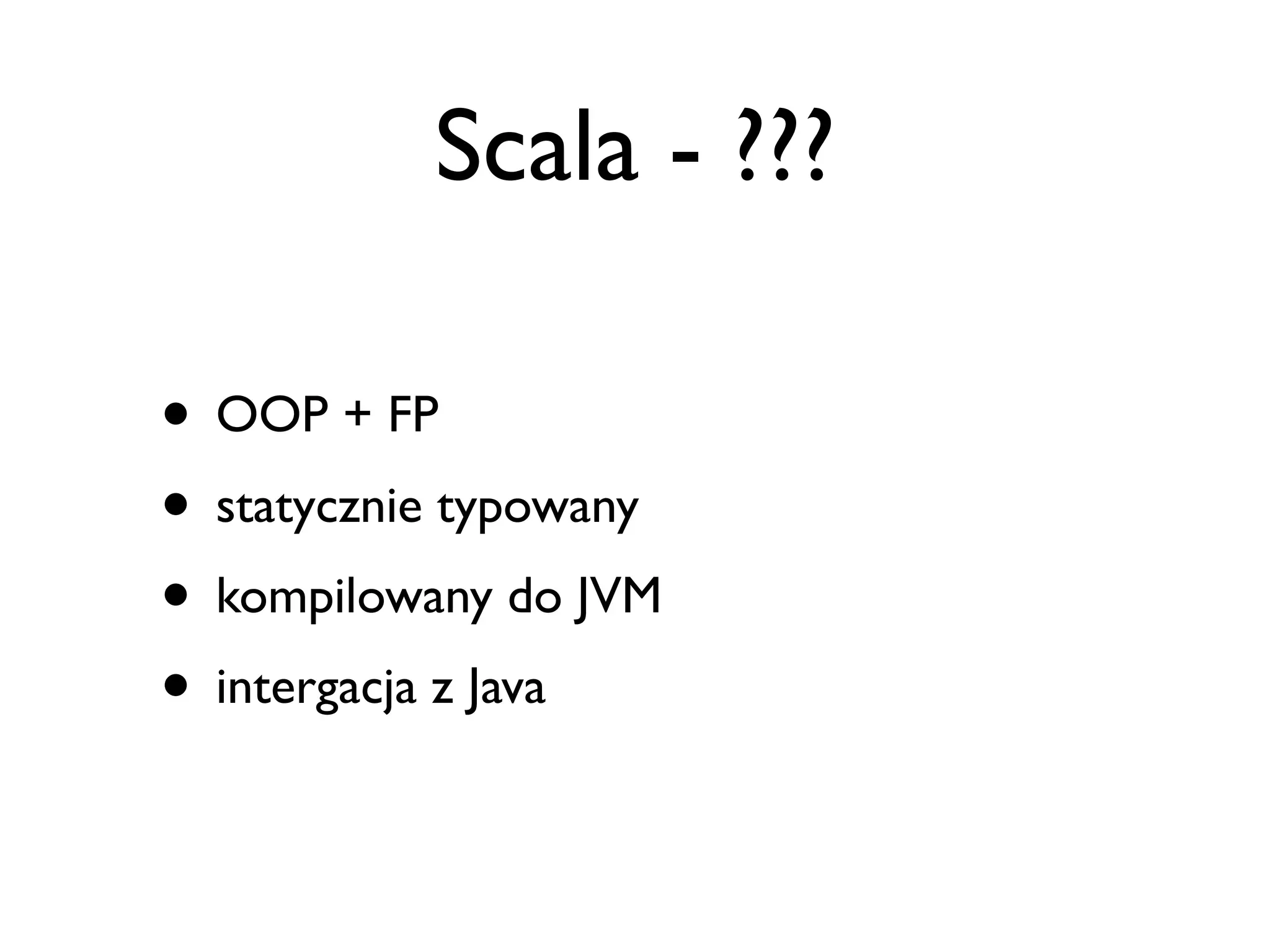
![scala jest trudna
trait FilterMonadic[+A, +Repr] {
def map[B, That](f: A => B)(implicit bf: CanBuildFrom[Repr, B, That]): That
// ...
}
def zipWithIndexIf[T](list: List[T])(pred: T => Boolean): List[(T, Option[Int])] = {
type R = List[(T, Option[Int])]
def doZip(zipped: R, left: List[T], index: Int): R = left match {
case x :: xs if pred(x) => doZip((x, Some(index)) :: zipped, xs, index + 1)
case x :: xs => doZip((x, None) :: zipped, xs, index)
case Nil => zipped
}
doZip(Nil, list, 0).reverse
}](https://image.slidesharecdn.com/scala-for-ruby-programmers-120105133142-phpapp01/75/Scala-for-ruby-programmers-3-2048.jpg)
![scala jest trudna
trait FilterMonadic[+A, +Repr] {
def map[B, That](f: A => B)(implicit bf: CanBuildFrom[Repr, B, That]): That
// ...
}
def zipWithIndexIf[T](list: List[T])(pred: T => Boolean): List[(T, Option[Int])] = {
type R = List[(T, Option[Int])]
def doZip(zipped: R, left: List[T], index: Int): R = left match {
case x :: xs if pred(x) => doZip((x, Some(index)) :: zipped, xs, index + 1)
case x :: xs => doZip((x, None) :: zipped, xs, index)
case Nil => zipped
}
doZip(Nil, list, 0).reverse
}](https://image.slidesharecdn.com/scala-for-ruby-programmers-120105133142-phpapp01/75/Scala-for-ruby-programmers-4-2048.jpg)
![serio?
List(1,2,3) map { e => e * 2 } // List[Int] = List(2, 4, 6)](https://image.slidesharecdn.com/scala-for-ruby-programmers-120105133142-phpapp01/75/Scala-for-ruby-programmers-5-2048.jpg)
![serio?
List(1,2,3) map { e => e * 2 } // List[Int] = List(2, 4, 6)
List(1,2,3) map (_*2) // List[Int] = List(2, 4, 6)
List(1,2,3) map (2*) // List[Int] = List(2, 4, 6)
List(1,2,3) filter { _ > 1 } // List[Int] = List(2, 3)
(1 to 10) foreach { e => println(e) }
(1 to 10) foreach println](https://image.slidesharecdn.com/scala-for-ruby-programmers-120105133142-phpapp01/75/Scala-for-ruby-programmers-6-2048.jpg)
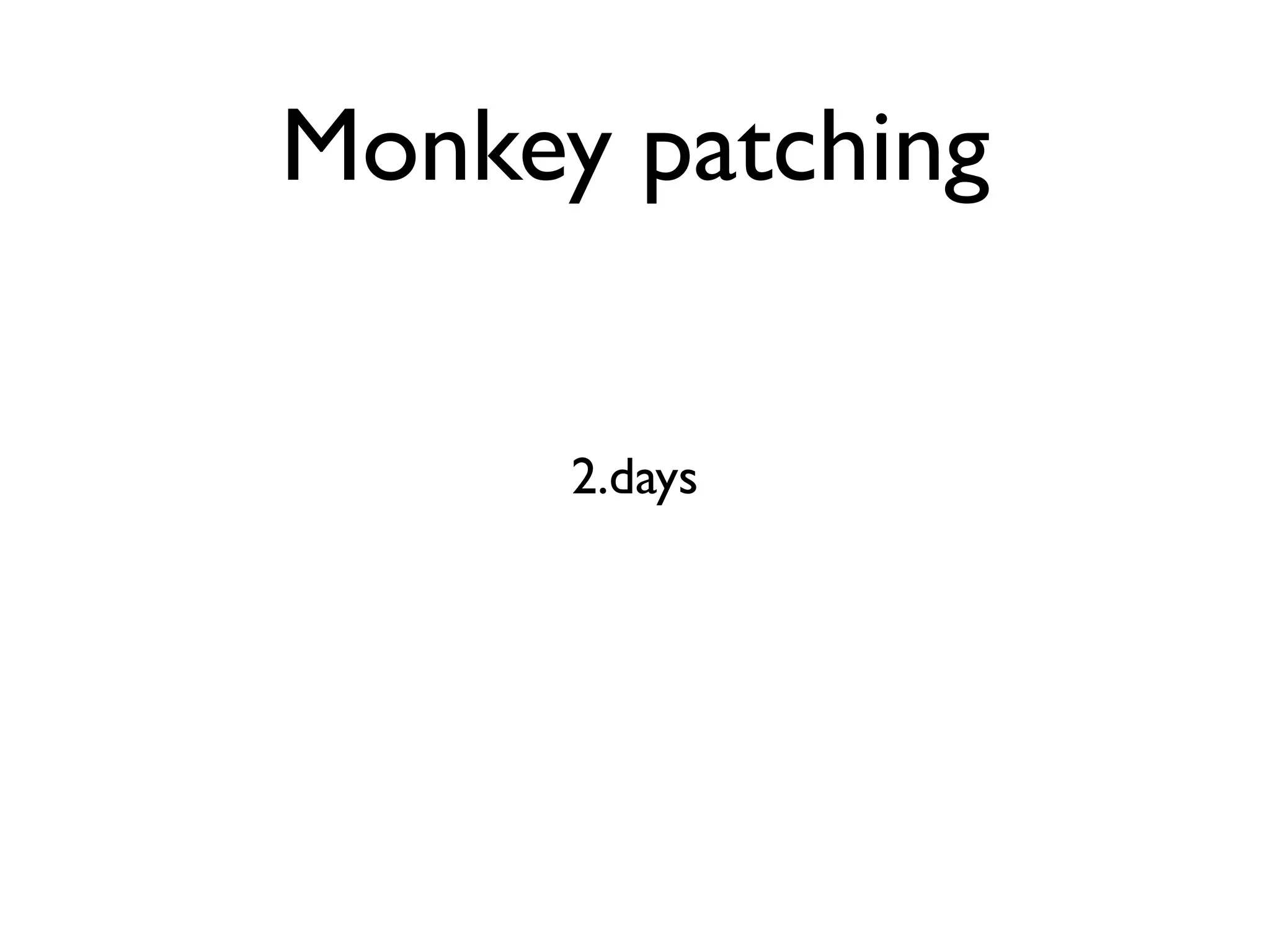
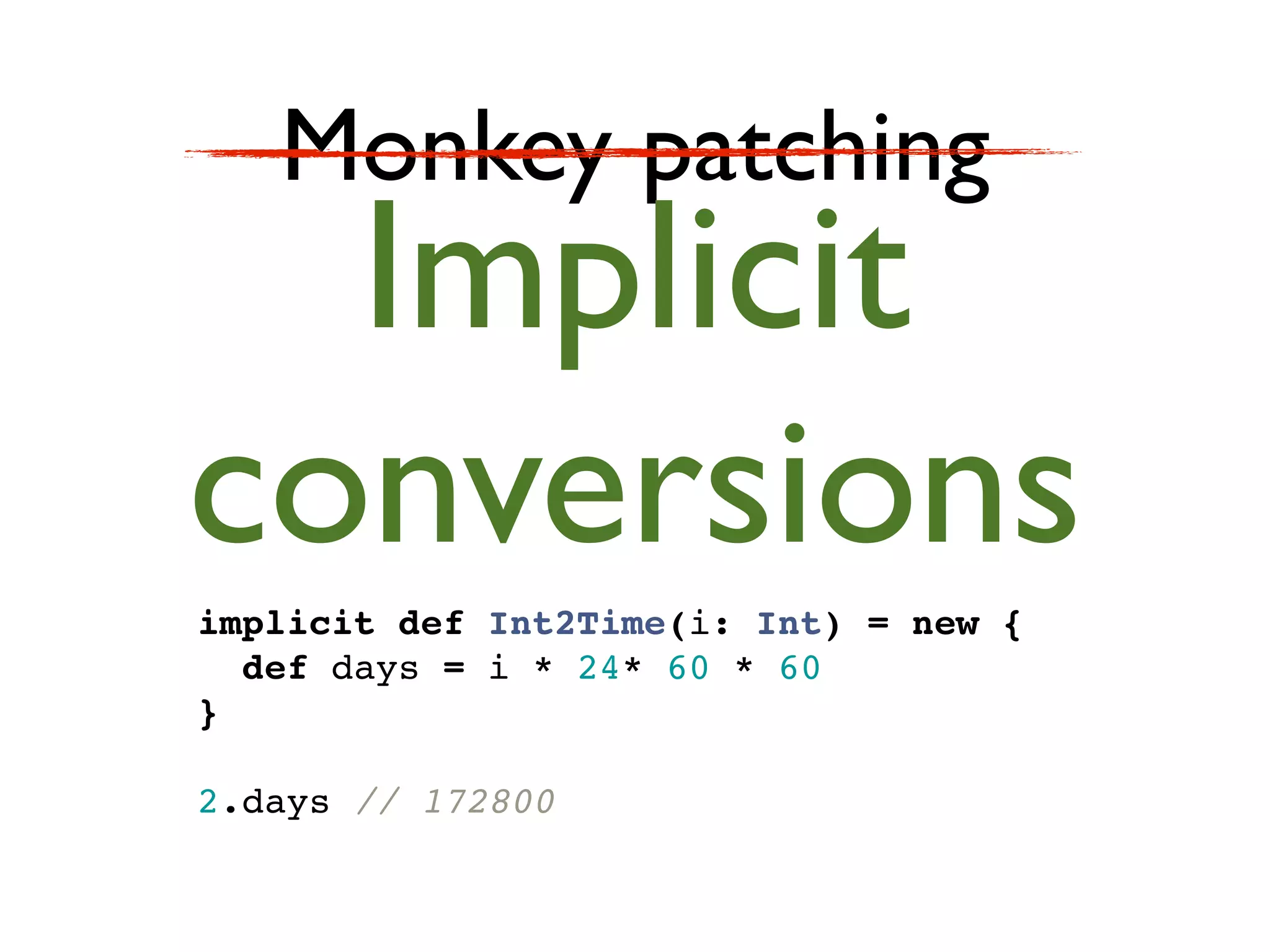
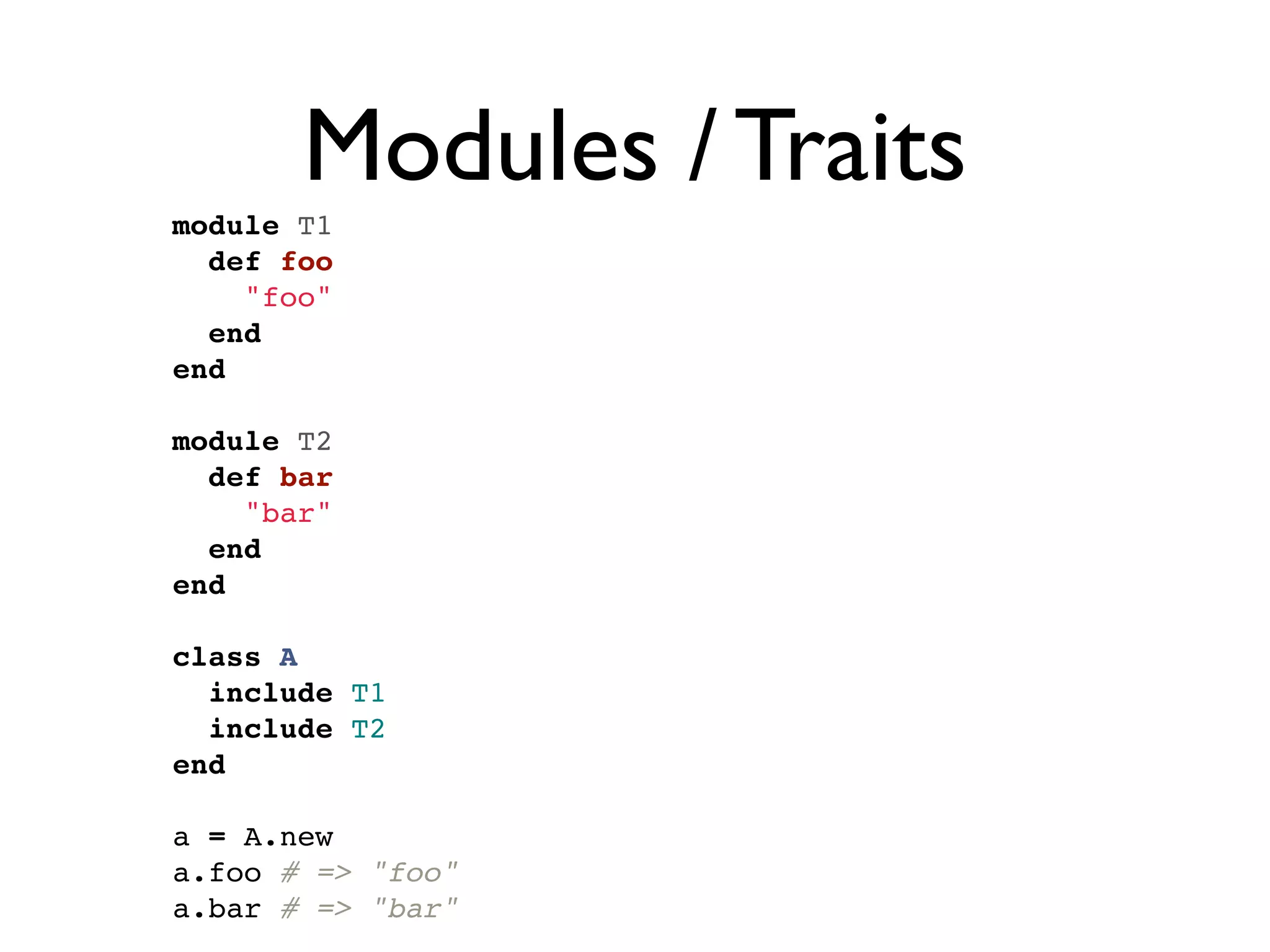
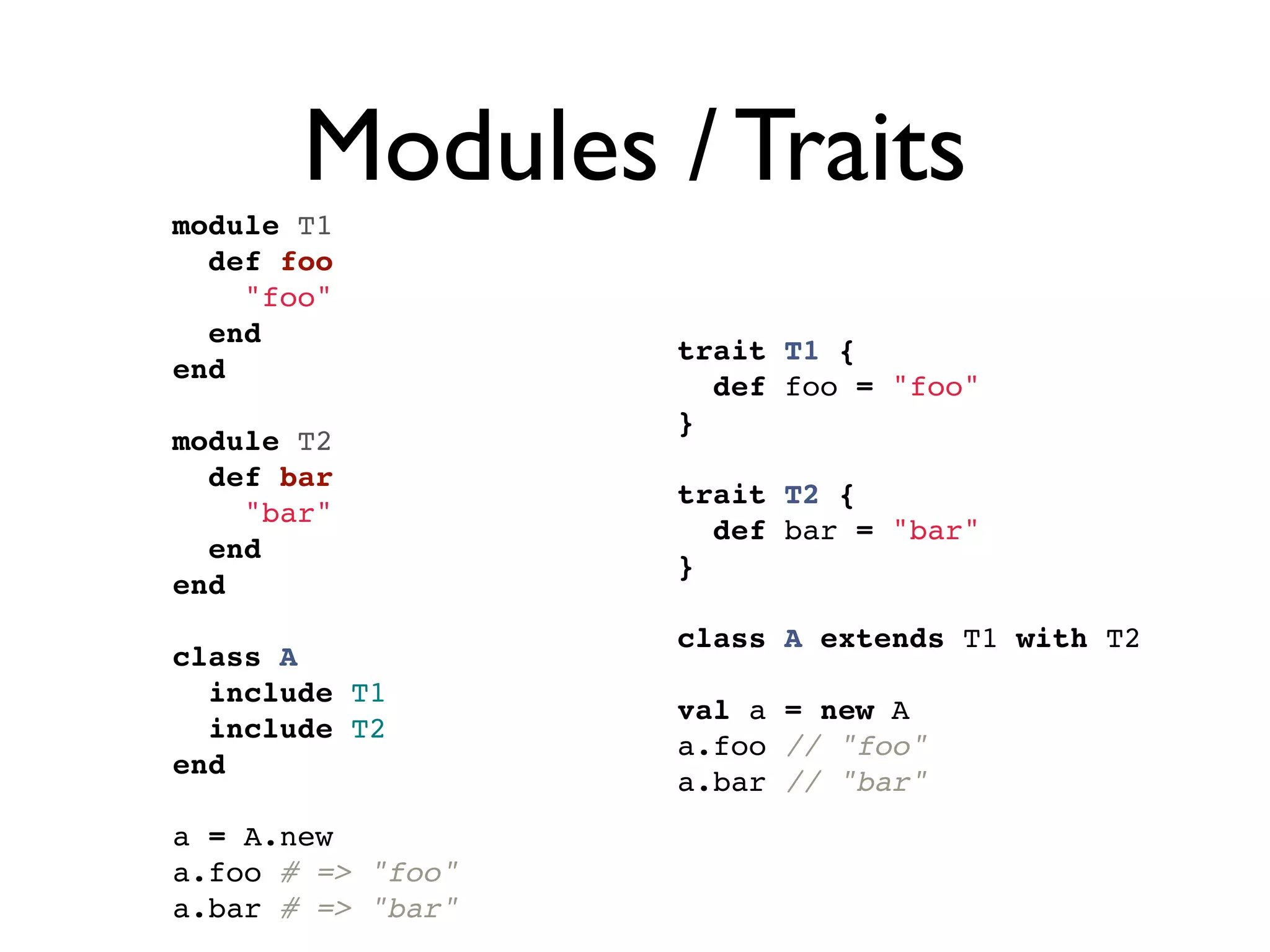
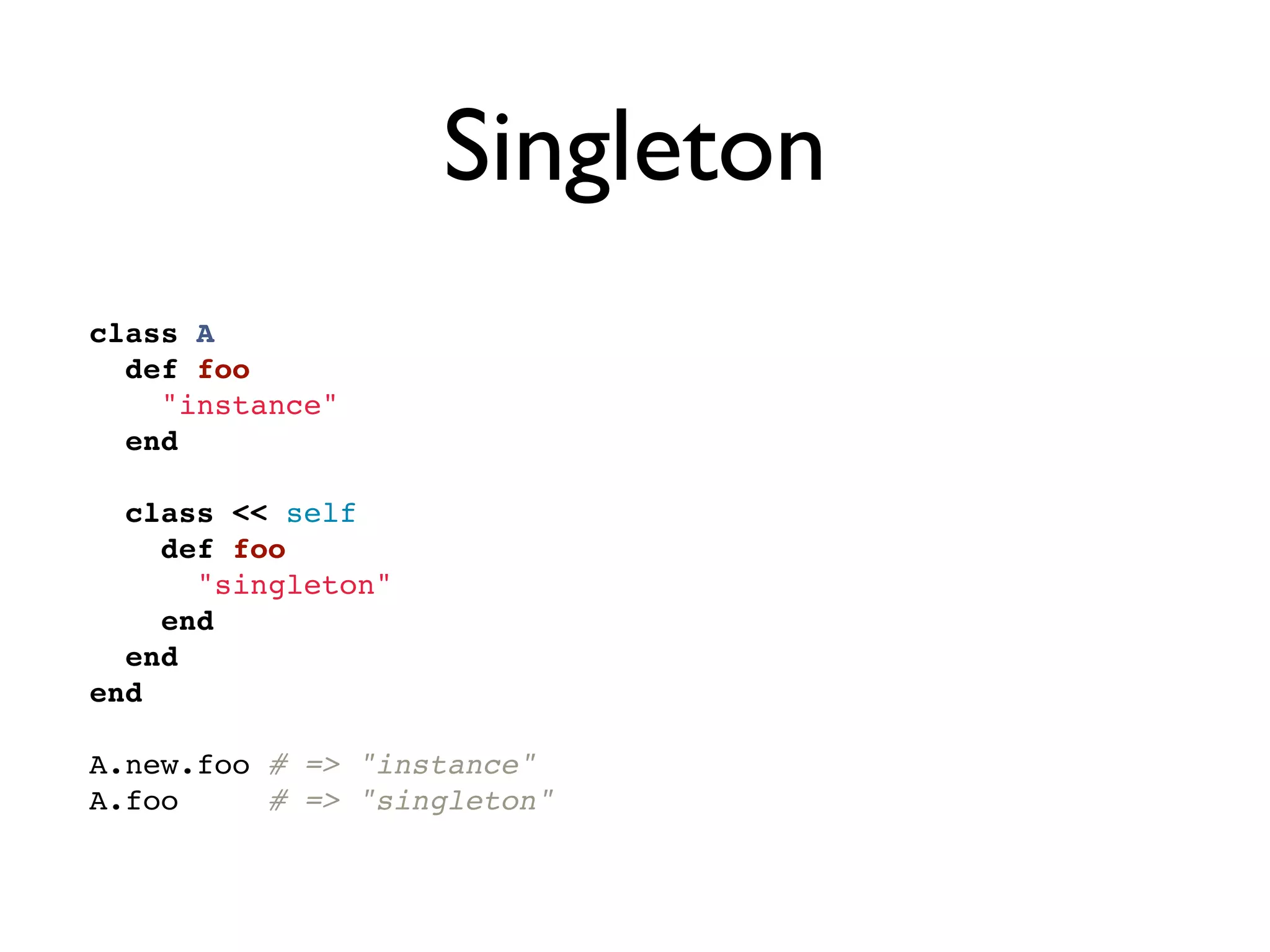
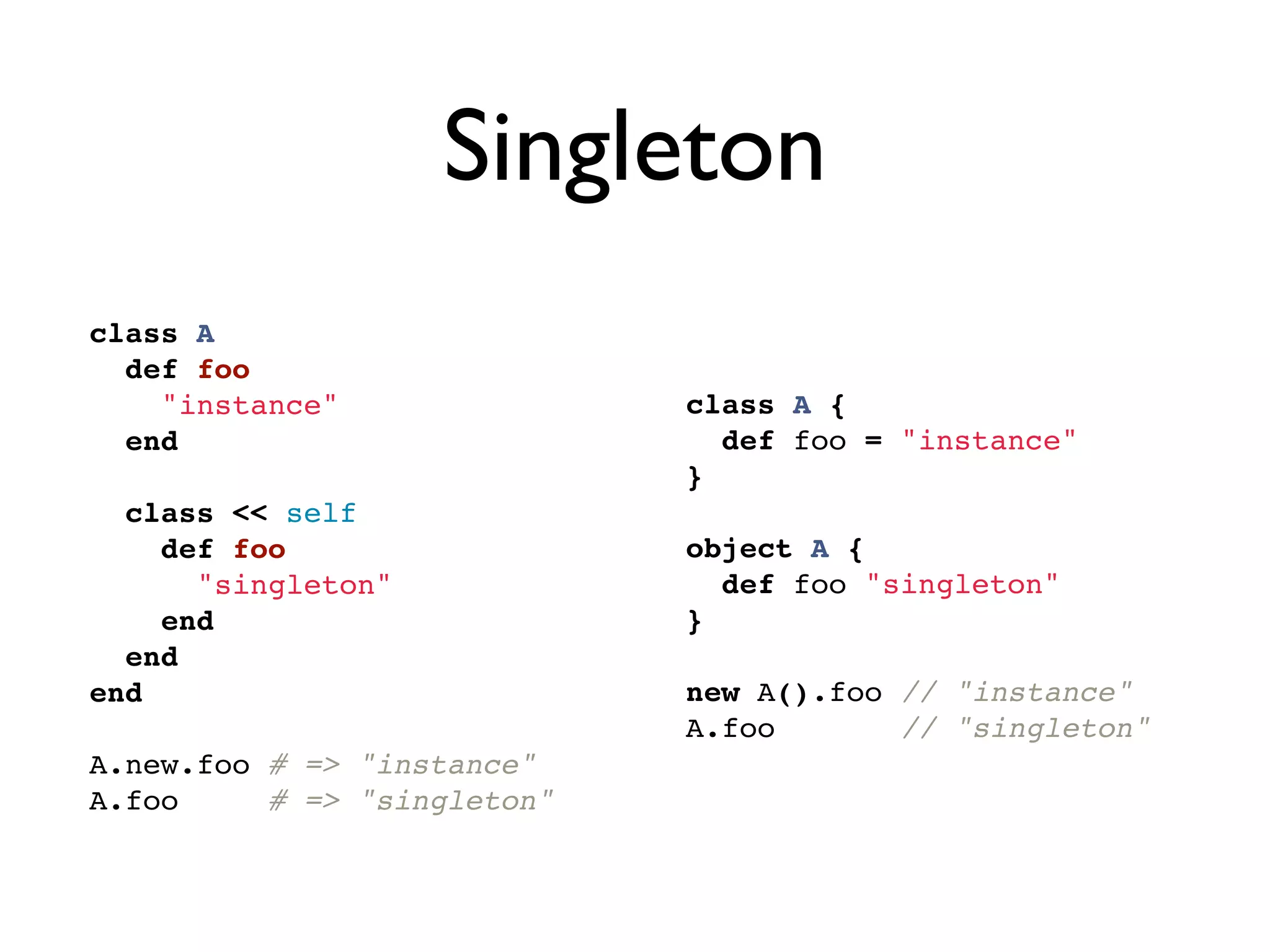
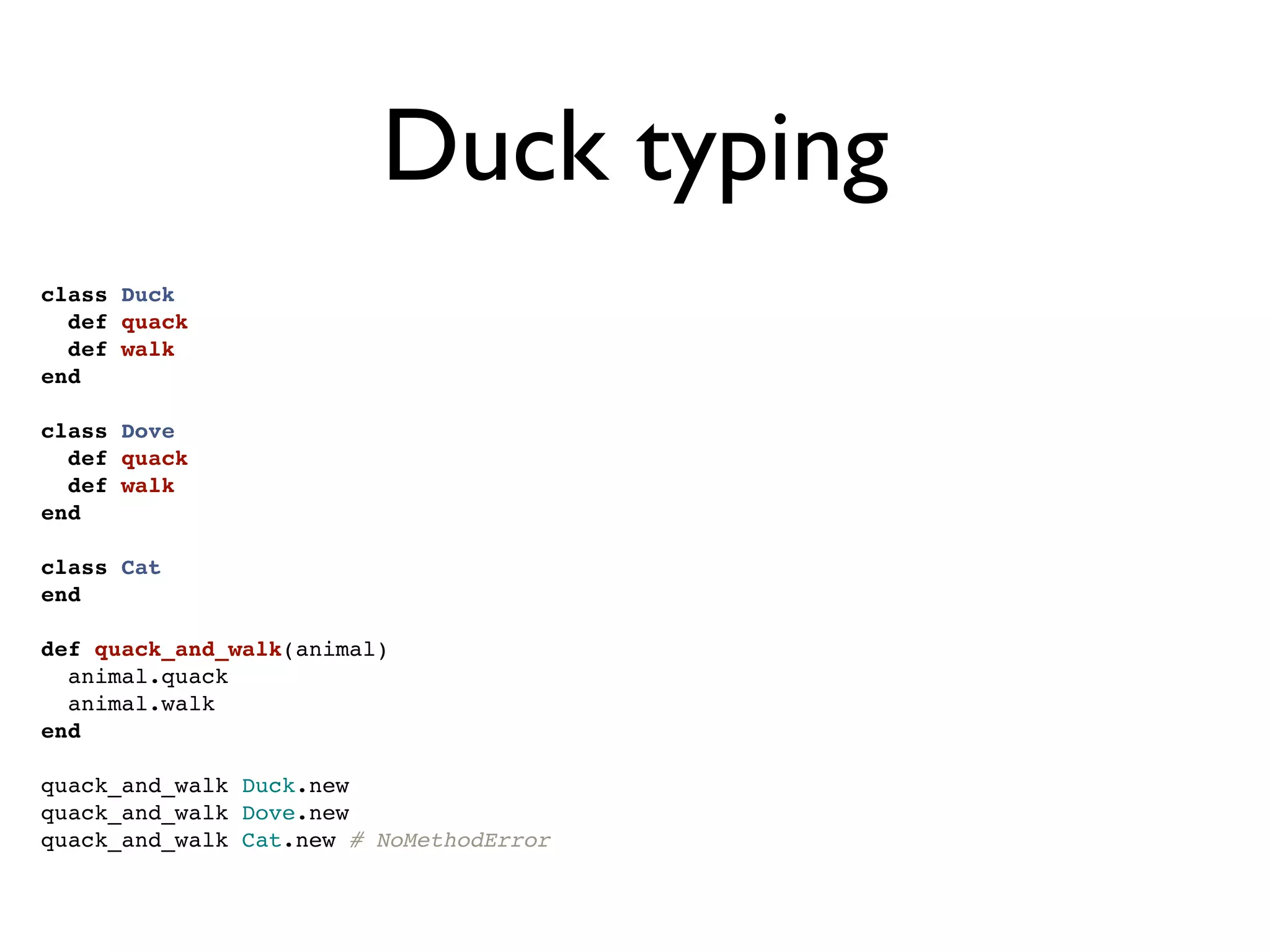
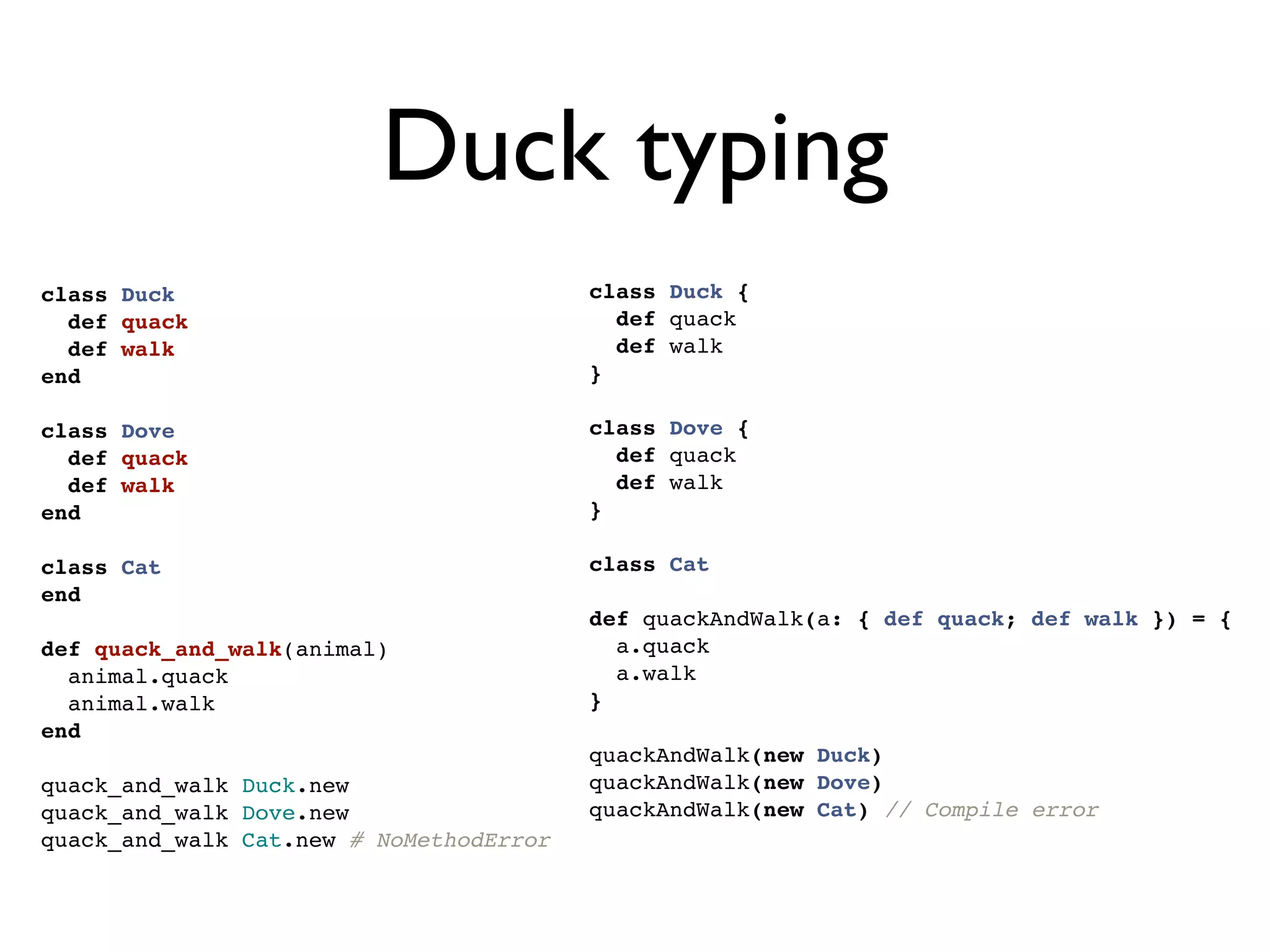
![DSL
class StackSpec extends FlatSpec with ShouldMatchers {
"A Stack" should "pop values in last-in-first-out order" in {
val stack = new Stack[Int]
stack.push(1)
stack.push(2)
stack.pop() should equal (2)
stack.pop() should equal (1)
}
it should "throw NoSuchElementException if an empty stack is popped" in {
val emptyStack = new Stack[String]
evaluating { emptyStack.pop() } should produce [NoSuchElementException]
}
}
http://scalatest.org](https://image.slidesharecdn.com/scala-for-ruby-programmers-120105133142-phpapp01/75/Scala-for-ruby-programmers-15-2048.jpg)
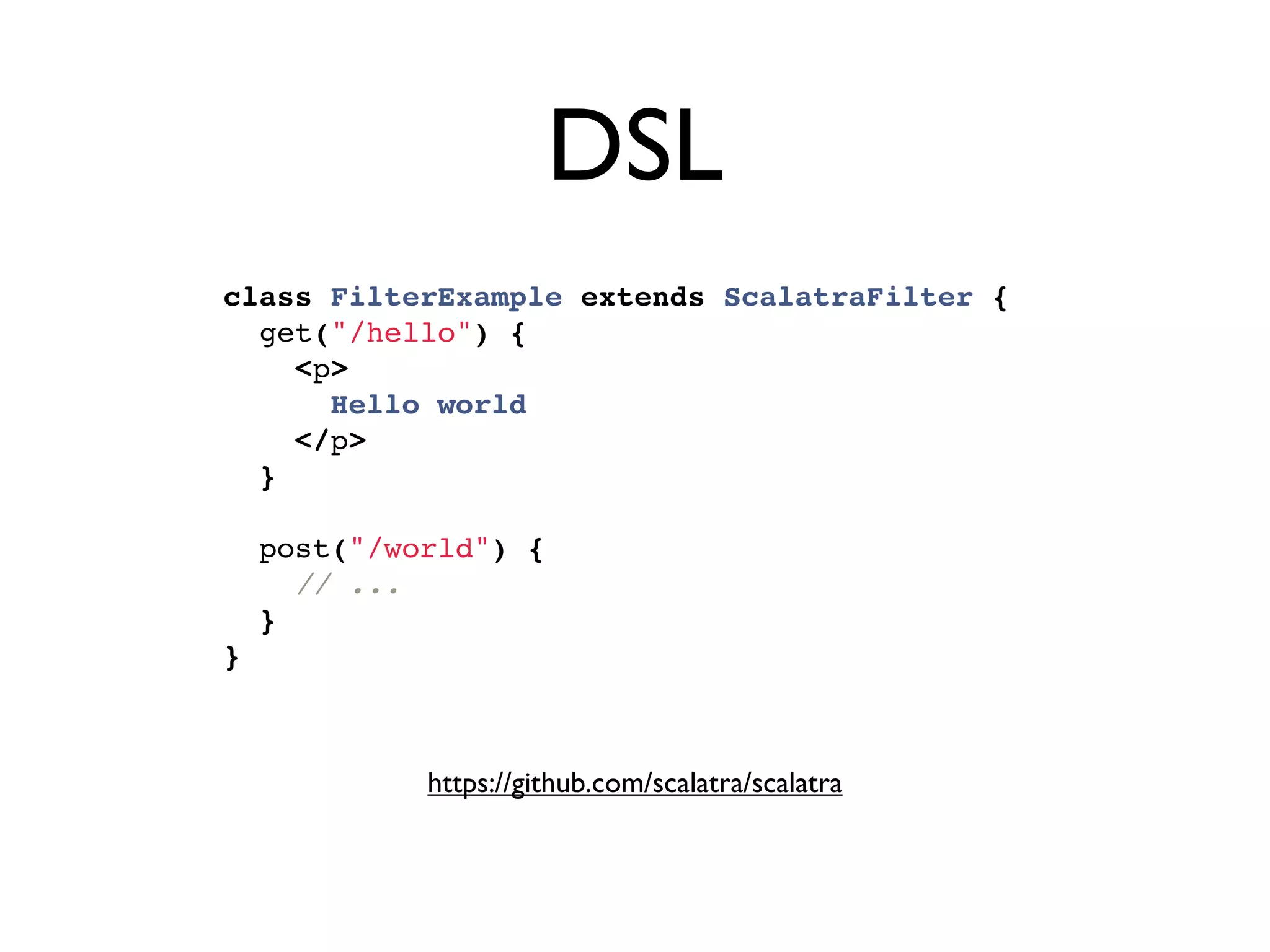
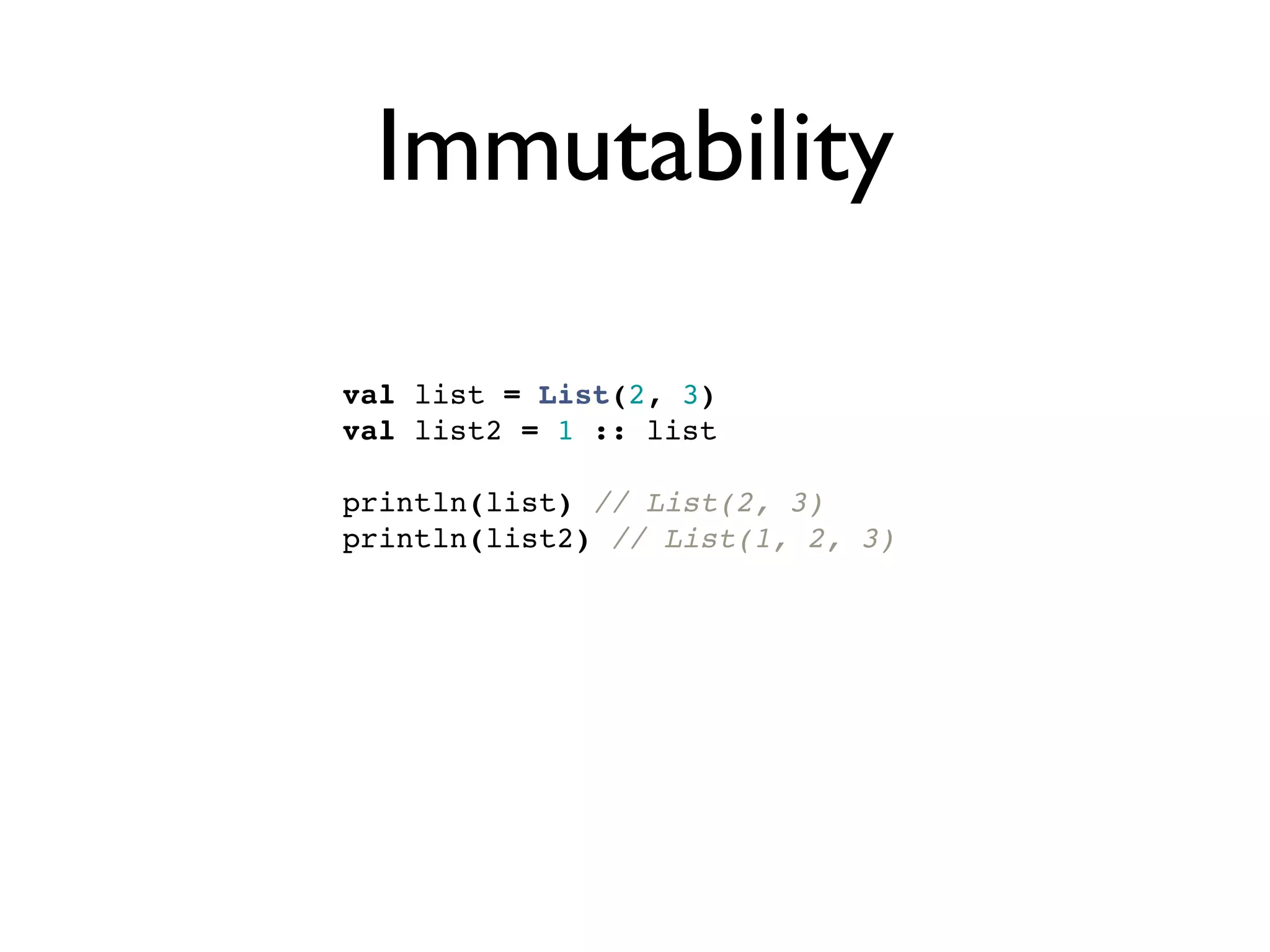
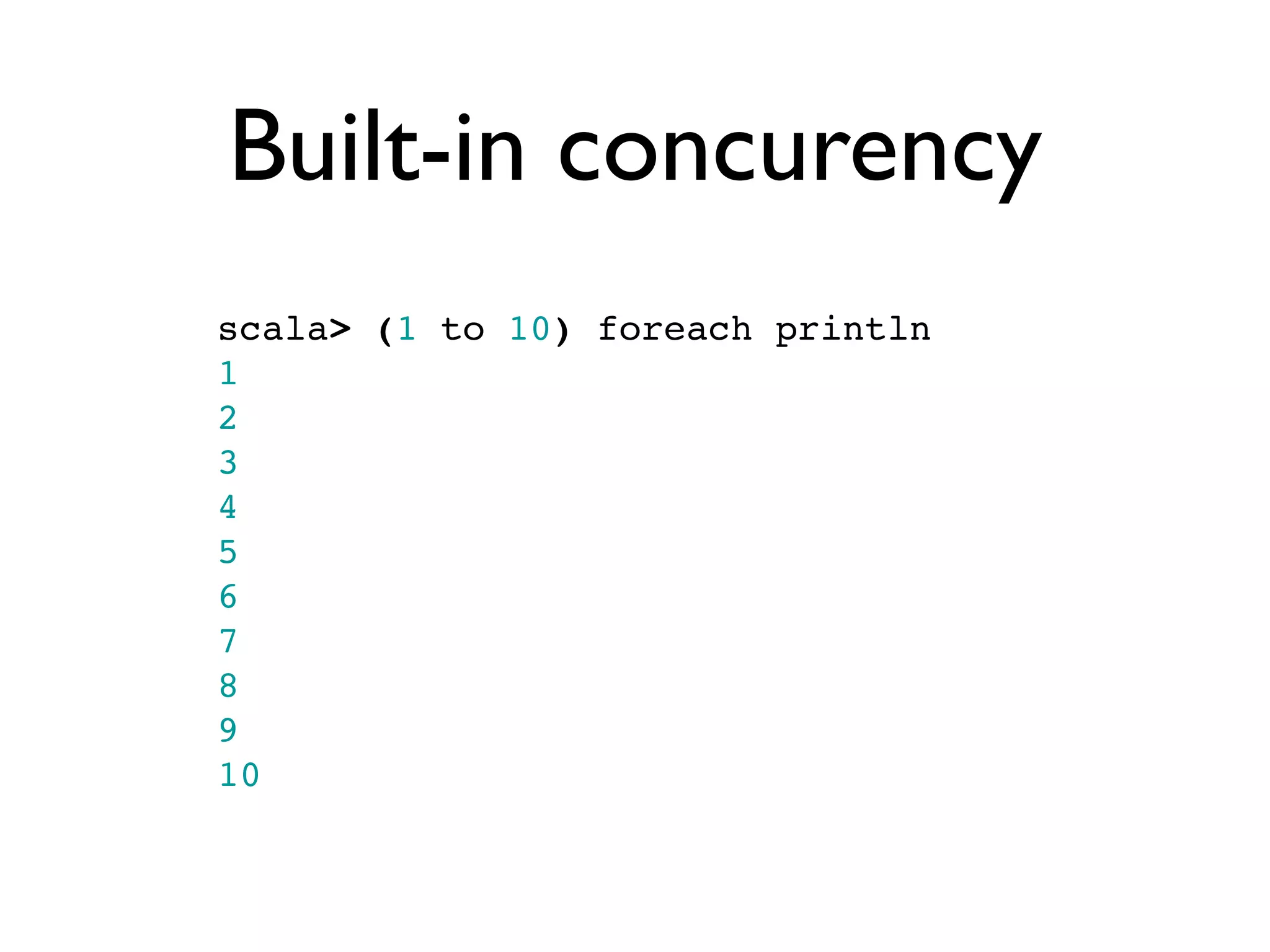
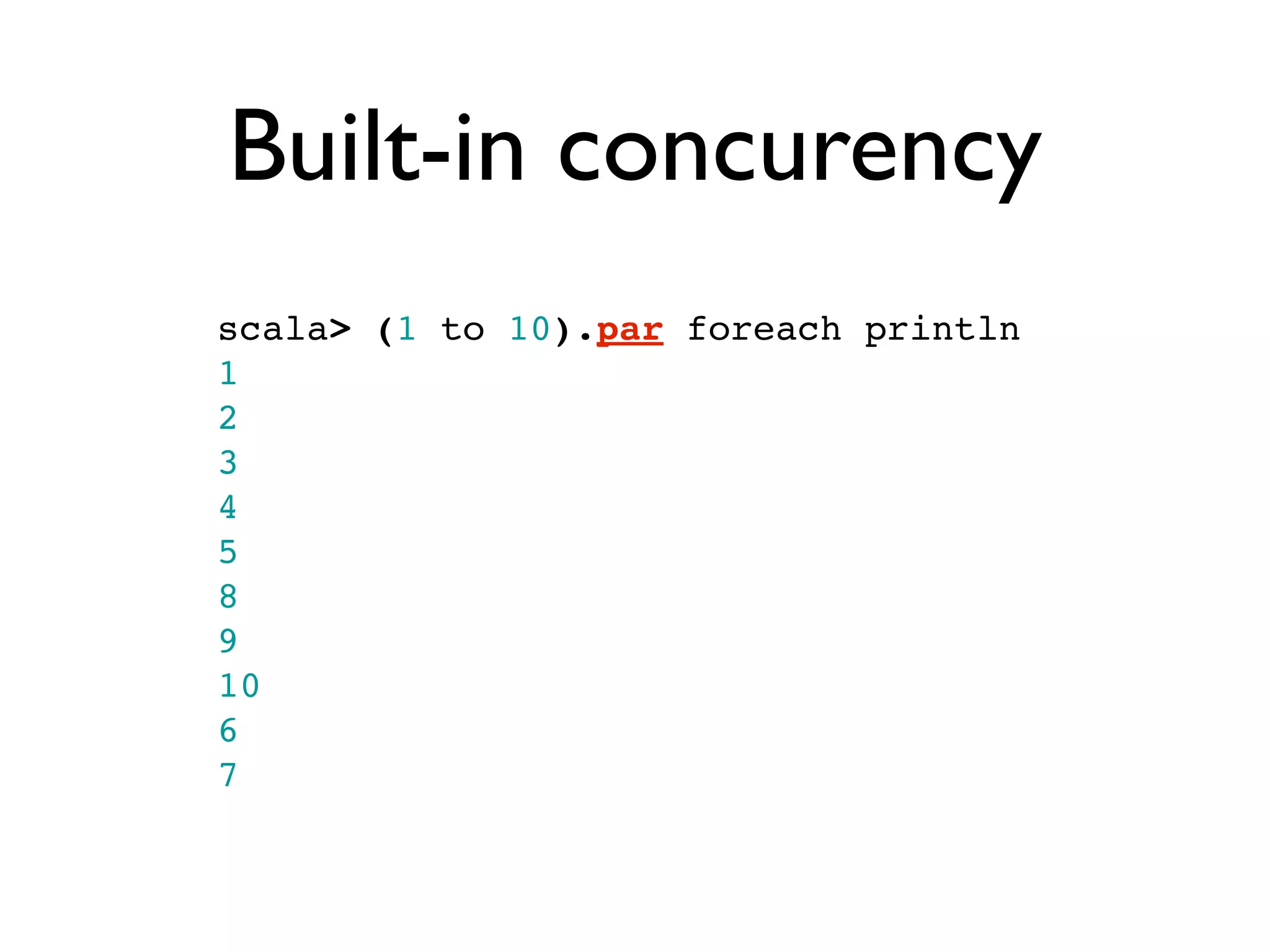
![Functional style
scala> Map(1 -> 2)
res9: scala.collection.immutable.Map[Int,Int] = Map(1 -> 2)](https://image.slidesharecdn.com/scala-for-ruby-programmers-120105133142-phpapp01/75/Scala-for-ruby-programmers-20-2048.jpg)
![Functional style
scala> Map(1 -> 2)
res9: scala.collection.immutable.Map[Int,Int] = Map(1 -> 2)
scala> Map(1 -> 2) get _
res10: (Int) => Option[Int] = <function1>](https://image.slidesharecdn.com/scala-for-ruby-programmers-120105133142-phpapp01/75/Scala-for-ruby-programmers-21-2048.jpg)
![Functional style
scala> Map(1 -> 2)
res9: scala.collection.immutable.Map[Int,Int] = Map(1 -> 2)
scala> Map(1 -> 2) get _
res10: (Int) => Option[Int] = <function1>
scala> Map(1 -> 2) get 1
res11: Option[Int] = Some(2)](https://image.slidesharecdn.com/scala-for-ruby-programmers-120105133142-phpapp01/75/Scala-for-ruby-programmers-22-2048.jpg)
![Functional style
scala> Map(1 -> 2)
res9: scala.collection.immutable.Map[Int,Int] = Map(1 -> 2)
scala> Map(1 -> 2) get _
res10: (Int) => Option[Int] = <function1>
scala> Map(1 -> 2) get 1
res11: Option[Int] = Some(2)
scala> Map(1 -> 2) get 3
res12: Option[Int] = None](https://image.slidesharecdn.com/scala-for-ruby-programmers-120105133142-phpapp01/75/Scala-for-ruby-programmers-23-2048.jpg)
![Functional style
scala> Map(1 -> 2)
res9: scala.collection.immutable.Map[Int,Int] = Map(1 -> 2)
scala> Map(1 -> 2) get _
res10: (Int) => Option[Int] = <function1>
scala> Map(1 -> 2) get 1
res11: Option[Int] = Some(2)
scala> Map(1 -> 2) get 3
res12: Option[Int] = None
scala> Map(1 -> 2) get 1 map (1+)
res13: Option[Int] = Some(3)](https://image.slidesharecdn.com/scala-for-ruby-programmers-120105133142-phpapp01/75/Scala-for-ruby-programmers-24-2048.jpg)
![Functional style
scala> Map(1 -> 2)
res9: scala.collection.immutable.Map[Int,Int] = Map(1 -> 2)
scala> Map(1 -> 2) get _
res10: (Int) => Option[Int] = <function1>
scala> Map(1 -> 2) get 1
res11: Option[Int] = Some(2)
scala> Map(1 -> 2) get 3
res12: Option[Int] = None
scala> Map(1 -> 2) get 1 map (1+)
res13: Option[Int] = Some(3)
scala> Map(1 -> 2) get 3 map (1+)
res14: Option[Int] = None](https://image.slidesharecdn.com/scala-for-ruby-programmers-120105133142-phpapp01/75/Scala-for-ruby-programmers-25-2048.jpg)
![Functional style
scala> Map(1 -> 2)
res9: scala.collection.immutable.Map[Int,Int] = Map(1 -> 2)
scala> Map(1 -> 2) get _
res10: (Int) => Option[Int] = <function1>
scala> Map(1 -> 2) get 1
res11: Option[Int] = Some(2)
scala> Map(1 -> 2) get 3
res12: Option[Int] = None
scala> Map(1 -> 2) get 1 map (1+)
res13: Option[Int] = Some(3)
scala> Map(1 -> 2) get 3 map (1+)
res14: Option[Int] = None
scala> Map(1 -> 2) get 1 map (1+) getOrElse 5
res15: Int = 3](https://image.slidesharecdn.com/scala-for-ruby-programmers-120105133142-phpapp01/75/Scala-for-ruby-programmers-26-2048.jpg)
![Functional style
scala> Map(1 -> 2)
res9: scala.collection.immutable.Map[Int,Int] = Map(1 -> 2)
scala> Map(1 -> 2) get _
res10: (Int) => Option[Int] = <function1>
scala> Map(1 -> 2) get 1
res11: Option[Int] = Some(2)
scala> Map(1 -> 2) get 3
res12: Option[Int] = None
scala> Map(1 -> 2) get 1 map (1+)
res13: Option[Int] = Some(3)
scala> Map(1 -> 2) get 3 map (1+)
res14: Option[Int] = None
scala> Map(1 -> 2) get 1 map (1+) getOrElse 5
res15: Int = 3
scala> Map(1 -> 2) get 3 map (1+) getOrElse 5
res16: Int = 5](https://image.slidesharecdn.com/scala-for-ruby-programmers-120105133142-phpapp01/75/Scala-for-ruby-programmers-27-2048.jpg)
